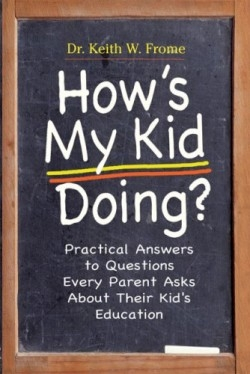
Hows My Kid Doing?
Practical Answers to Questions Every Parent Asks About Their Kids Education
- 2008 INDIES Winner
- Bronze, Parenting (Adult Nonfiction)
Charter schools. The No Child Left Behind Act. Cheating. Bullying. More than ever, parents have options for their children’s K-12 education and information is available about issues in every sphere of education—the social, curricular, administrative. But the complexities underlying most issues leave parents with more questions than answers.
Over the course of his career as headmaster, researcher, curriculum developer, and author (the award-winning What Not to Expect: A Meditation on the Spirituality of Parenting), Keith W. Frome, Ed.D., has been asked a lot of questions. His book How’s My Kid Doing? compiles those that were either frequently raised or that were “rare and insightful, and made me think in new ways.” The book is divided into three parts: Academics and Learning; Administration and Education Policy; and Social, Emotional, and Extracurricular School Issues. Within each section, the questions are organized alphabetically.
The linear organization and Q and A format belies the philosophical approach Frome takes. As he notes in the introduction, the answers he gives aren’t answers, but “beginnings.” Frome’s responses often help the questioner sort out what she or he is really asking—rarely are questions just questions; they contain hopes, dreams, anxieties, assumptions, and value judgments. His reply to a question about a failing grade, for example, is a meditation on the positive role that failure has, using an elegant quote from economist Vilfredo Pareto: “Give me the fruitful error any time, full of seeds, bursting with its own corrections. You can keep your sterile truth for yourself.”
Always, Frome’s answers seek to educate and guide. His response to a question on “good schools” begins with a short but comprehensive lesson on the different ways schools measure quality. Frome’s approach won’t work for all parents—particularly those looking for a pat solution. That is not to say that Frome gives no practical advice; in fact, his answer on “good schools” concludes with a list of investigative tasks parents can perform.
The book’s more limiting factor is that the questions—and answers—betray a solid middle class experience. For example, one question begins, “We’re lucky enough to afford to send our kids to private school…” No question addresses issues poorer communities face, like parents whose multiple jobs leave kids without a lot of structured time after school.
Nonetheless, this book will serve as a thoughtful, fair-minded primer on general issues in education, providing parents with the means to formulate, customize, or find answers themselves. After all, as Frome himself would assert, learning is a lifelong affair.
Reviewed by
Aimee Houser
Disclosure: This article is not an endorsement, but a review. The publisher of this book provided free copies of the book to have their book reviewed by a professional reviewer. No fee was paid by the publisher for this review. Foreword Reviews only recommends books that we love. Foreword Magazine, Inc. is disclosing this in accordance with the Federal Trade Commission’s 16 CFR, Part 255.
